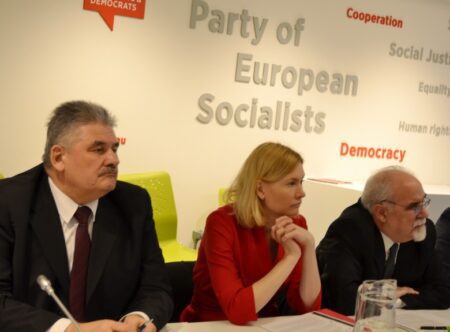The PES has long pushed for stronger social rights and with the legislative term coming to an end, several proposals in the social field are set to be finalised. If adopted, these initiatives will bring tangible improvements for workers and families, and bring the European Pillar of Social Rights one step closer to implementation.
Speaking at his first meeting as the new Chair of the PES EPSCO network, the Portuguese Minister of Solidarity, Employment and Social Security, José António Vieira da Silva, said:
“When the European Pillar of Social Rights was proclaimed in 2017 it came as a major step forward for social rights in the EU. After years of pushing austerity and prioritising economic freedoms over workers’ and citizens’ rights, we finally managed to set the ground for the social turn that Europe needs.
“As PES Ministers we are proud that social issues are back on the EU’s agenda. It is time to establish a real counterweight to neoliberal macroeconomic policies. Social Progress must become a clear focus again.
“Now that the negotiations on the Social Fairness Package are about to conclude, we are giving the Pillar its soul. The European Labour Authority must be in place quickly to fight workers’ exploitation and social dumping. The transparent and Predictable Working Conditions Directive must provide better conditions for all kinds of work, including those facilitated by digital platforms. The Work-Life Balance Directive has to widen leave possibilities for family members and enable a fair sharing of care-work among partners. This way, the European Pillar of Social Rights is becoming more than a memorandum, it is becoming a new benchmark for social progress in the European Union.”
Several initiatives are close to being adopted, including the Social Fairness Package and with it the Work-Life Balance Directive, the Transparent and Predictable Working Conditions Directive, the Recommendations on Access to Social Protection for Workers and the Self Employed and the European Labour Authority.
The meeting was attended by:
- José António Vieira da Silva, Minister of Labour, Solidarity, and Social Security, Portugal
- Riina Sikkut, Minister for Health and Labour, Estonia
- Rolf Schmachtenberg, State Secretary, Federal Ministry of Labour and Social Affairs, Germany
- Dan Kersch, Minister for Labour, Employment, Social and Solidarity Economy, Luxembourg
- Ján Richter, Minister of Labour, Social Affairs and Family, Slovakia
- Ylva Johansson, Minister for Employment, Sweden
- Marie Arena, Member of the European Parliament, S&D group in the European Parliament
- Luca Visentini, General Secretary, European Trade Union Confederation
- Liina Carr, Confederal Secretary, European Trade Union Confederation



